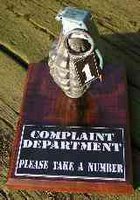
I've been thinking more than a little bit about (dis)contentment, complaining, and grumbling. Reading Numbers
11 &
12 intensified thoughts along these lines.
And the people complained in the hearing of the LORD about their misfortunes, and when the LORD heard it, his anger was kindled, and the fire of the LORD burned among them and consumed some outlying parts of the camp. -Numbers 11:1
The first verse of Numbers 11 tells us that the people complained about their hardships and that the LORD heard them. How did God react to their complaining? Any reader should deduce that He was not pleased to hear them complain; His anger was aroused. Obviously,
their complaining angered the LORD. It angered Him so much that He sent fire that burned among them and consumed some of the outskirts of the camp. Verse 2 tells us that the LORD got their attention with the fire and they cried out to Moses for help. When Moses prayed to the LORD, the fire died down.
They had complained about their hardships, which do not seem to be much upon examination of
Numbers 10. One can infer that they were complaining for no “good” reason. On this verse Matthew Henry notes, “Though God graciously gives us leave to complain to him when there is cause (
Ps. 142:2), He is justly provoked if we complain (of Him) when there is no cause.”
In
Numbers 11:4-6 we note the second occurrence of complaining. This time the people are complaining about the food. They are unhappy with the manna the LORD has been providing. In their clouded memories they fondly recall the fish they had to eat in Egypt and the other comforts from which they now feel denied. They want meat to eat. Manna just isn’t “cutting it” for them anymore. The text spends
verses 7-9 explaining to us just how well the LORD has been providing for them with the above mentioned manna. Again, it appears they are complaining without cause.
Verse 10 tells us that
the LORD became exceedingly angry, for "the anger of the LORD blazed hotly."
In His anger, how does God respond? Unfortunately for them, He gives them what they want. They will have meat for a whole month and they are stricken with a plague as well. How seriously does God take complaints? In
11:34, we are led to believe that those who wanted meat died there.
In
Numbers 12 we find Miriam and Aaron talking against Moses because of his Cushite wife. Verse 2 prepares us with the words, “And the LORD heard it.” This complaint is actually somewhat similar to those in chapter 11, for they are finding fault with Moses and his leadership. If Moses would have left them in Egypt, they would not have all of these problems. If they would have still been Egypt, they would have good food, and so on.
It seems that chapter 12 shows us that
a complaint against Moses is a complaint against God as He appointed Moses (similar to how rebellion against civil authorities is rebellion against God -
Rom 13:1-7). Although they reveal their racism, their real complaint was that they were not happy with Moses, the one God chose as their leader. God upholds His choice to them by noting His friendship with Moses. Again, we read that the anger of the LORD burned against them (13:9).
How does God respond to this complaining? Miriam, who appears to be the instigator as her name was mentioned first, is punished with leprosy and is graciously kept outside the camp in isolation for a week. Scripture not only records
God’s anger and disapproval of complaining, but how He acts on that anger by punishing the complaining party. We would do well to note that
God is not tolerant of complaining either against Him directly or indirectly, as was the case of complaining against Moses.
 Do all things without grumbling or questioning
Do all things without grumbling or questioning
-Philippians 2:14
Sometimes its easy to do. It's always easy
to complain. Often it's hard to do and NOT complain.
Is there a relationship between complaining and unbelief? If so, what is that relationship? It seems only natural that unbelief or a lack of faith would lead to complaining.
One that was believing in God and trusting Him by faith would not complain as the mere act of complaining exhibits a lack of contentment. One might even conclude that complaining is a form of covetousness. Matthew Henry notes, “
It is an offense to God to let our desires go beyond our faith.”
In the New Testament we read that anything that does not come from faith is sin (
Romans 14:23). God's people had shown a lack of faith in God and His provisions of manna by complaining and desiring meat, which the LORD had not seen fit to give to them. They did not trust in His guidance or leadership. They did not believe in His choice of Moses and thus complained again. Wanting the meat in and of itself is not a sin, but desiring something other than what the LORD has given shows a lack of contentment and unbelief. “
What is lawful of itself becomes evil to us when it is what God does not allot to us and yet we eagerly desire it.” -Matthew Henry
The relationship between complaining and unbelief seems to be a rather strong one. I would consider it an odd thing indeed to hear of one complaining of God while having complete faith and belief in His handling of the situation. It seems ludicrous to even think of such a possibility.
If you find yourself with burger without meat, remember you get plenty of meat at home. Be polite and have some
real tomato ketchup ... nuthin' but the best.

Suggested reading in this regard would be John Piper,
(The Purifying Power of Living by Faith in) Future Grace. In it Piper explains that we are a people who forget. We forget His gracious provision in the past, whereby He establishes His character ... and trustworthiness. We rest in His provisions and rejoice in His ability and willingness to provide for our needs in the future.
Christian contentment is that sweet, inward, quiet, gracious frame of spirit, which freely submits to and delights in God's wise and fatherly disposal in every condition.
-Jeremiah Burroughs
Content people do not grumble. Numbers 11-12 show us that complaining is a symptom. It is not the disease itself, but unbelief is. When we fail to believe in God and trust His control we forget Who is in control. We lose sight that He has things in hand and we see only the problems. When we forget that God is the solution to those problems, complaining will often erupt. God is gracious, and He was gracious in the Old Testament, but we need to understand the magnitude of His displeasure over complaining. Hopefully, we can see the cause is our unbelief and
ask God to cure the disease rather than merely treating the symptom. We would benefit greatly by making Mark 9:24 our prayer, “...I do believe; help me overcome my unbelief.”
 From the minds of comedians Steven Wright and/or George Carlin. We're not sure who is responsible for which thought.
From the minds of comedians Steven Wright and/or George Carlin. We're not sure who is responsible for which thought.























